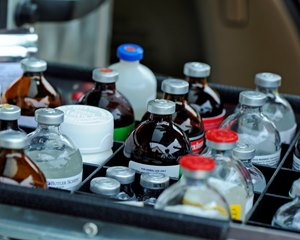CHRB Moves Forward on Out-of-Competition Sanctions


The California Horse Racing Board took a step toward a policy of out-of-competition testing with teeth during its monthly meeting Dec. 13 at Los Alamitos Race Course.
Out-of-competition testing is conducted in California, but the state does not have much ability to sanction licensees if there is a positive test.
The proposal approved Thursday by the CHRB, however, would enable the state to levy penalties for positive out-of-competition tests for a variety of drugs—erythropoietin (EPO), darbepoetin, "venoms," growth hormone, ractopamine, zilpaterol, aminoimidazole carboxamide ribonucleotide, Hemopure, myo-inositol trispyrophosphate, Oxyglobin, thymosin beta, anabolic steroids, "anabolic agents," EPO-receptor agonists, hypoxia-inducible factor stabilizers, altrenogest, chorionic gonadotropin, luteinizing hormone, corticotrophins, beta-2 agonists, aromatase inhibitors, estrogen receptor modulators, anti-estrogenic substances, myostatin inhibitors, certain metabolic modulators, and certain diuretics and masking agents.
The required changes to the veterinary practices rule and a newly created out-of-competition rule still need to be approved by California's Office of Administrative Law and will have to be signed by the Secretary of State to be fully enacted. According to CHRB counsel John McDonough and Robert Brodnik, the process could be completed by the spring.
According to the new CHRB rule wording, if a positive out-of-competition test comes from "inside a licensed enclosure," the trainer will be the "absolute insurer" and, ultimately, held responsible. If a positive test comes from outside a licensed enclosure, however, "the trainer, owner, foreman, groom, and/or any other licensee shown by a preponderance of the evidence to have been responsible for the care" could face sanctions.
The new rule would also place any horse that tests positive for a prohibited substance from an out-of-competition test on the veterinarian's list "for a minimum of 180 days, from the date the owner and trainer waive their right to a split sample, or from the date that a split sample laboratory confirms the presence of the prohibited substance."
Out-of-competition testing began in California in 2007, according to CHRB equine medical director Dr. Rick Arthur, but prosecutions have been severely limited by rules that were not designed to specifically address out-of-competition testing. If some prohibited substances (like EPO and others) currently come up in an out-of-competition test, they are technically actionable (although it would have been prosecuted as a drug "possession"), Arthur said, but a positive test has not been triggered for those substances since out-of-competition testing began in the state. Arthur said the proposal approved Thursday would remedy the rule to specifically address out-of-competition testing.
